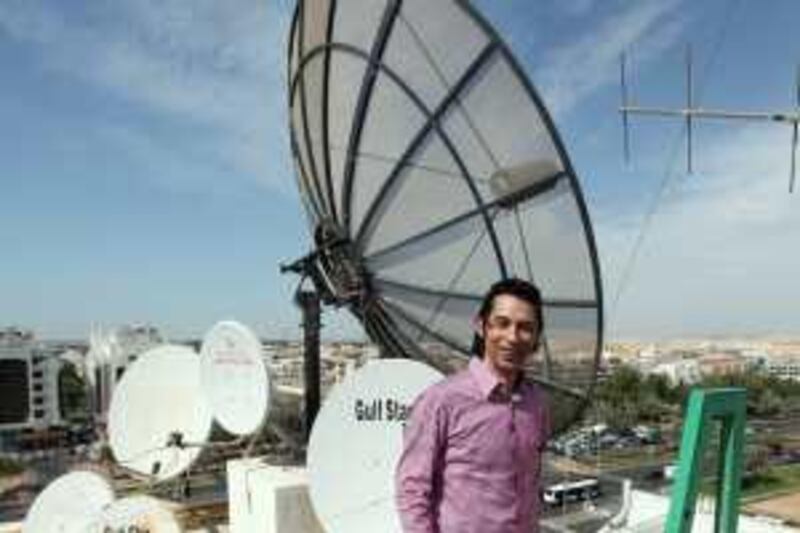ABU DHABI // High-rise buildings, and the tall cranes needed to build them, are jamming satellite TV feeds across the Emirates. With the World Cup 2010 broadcasts from South Africa only a month away, pay-TV customers and companies are complaining about weak signals.
Baiwa Aliyu's TV reception was perfect until two years ago, when he began to lose international channels in his second-floor flat behind the Sharjah Mega Mall. Mr Aliyu, 49, a director of the Nigerian Trade Centre in Dubai, wondered if the five buildings being built around his four-storey home were blocking the signal between his rooftop dish and the orbiting satellite. "The [buildings] are very high, more than 20 floors," he said. "One of them was finished last year."
An inspection by Technosat, the satellite communications provider, confirmed Mr Aliyu's suspicions. Tarek Awwad, the company's technical manager, tried redirecting Mr Aliyu's dish, but the picture quality was gone. "Many, many times this happens in Sharjah and Abu Dhabi," Mr Awwad said. The complaints started after the new building projects, some 70 stories high, began. "In low buildings, they cannot see. The beam is completely blocked." Mr Awwad conceded that he was powerless to help his customers.
"You cannot tell the developer, 'Please don't make your building more high than my building'," he said. "I have so many friends who want to watch the World Cup, and they cannot receive [a signal] because of this blocking." Tariq Chebaro and his neighbours, in Al Muroor, blamed the construction of several new Abu Dhabi towers for cutting off their satellite feeds. "It turns out there was a crane that was placed in our direction, and whenever the crane moves, the signal cuts off and you have to refresh it," the 35-year-old Lebanese engineer said.
"I asked the guys at the coffee shop downstairs and they have a problem too. You could see the crane moving, and we realised there was a pattern." Orbit Showtime Network sent a technician to visit Mr Chebaro. On the roof, they were amazed to find a "graveyard of abandoned dishes". Fareed Ahmed, Eurostar's assistant manager for technical services, said the interference might have been caused by wireless remotes controlling the nearby cranes and crossing the signals.
"Sometimes with the radars, wireless controllers can be an obstruction," he said. The problem could be a blow to the satellite TV industry, admitted Mike Whittaker, the vice-president of broadcast operations and technology for the Orbit Showtime Network, the biggest TV subscriptions platform in the region. "Hopefully, we can work around it. If you can't get us through satellite, hopefully you can get us through cable or IPTV. (internet protocol television)."
The laws of physics dictate that satellite signals can be blocked by rain, trees limbs, or even buildings and construction cranes, he added. "If you're living in an area where there are a lot of high-rises, it's quite likely that your signal will degrade." Careful urban planning is the best way to cure reception problem, with height restrictions for certain blocks, Mr Whittaker said. The Urban Planning Council's 2030 plan seeks to preserve Abu Dhabi's flat 20-storey to 25-storey skyline, with "selected pockets of taller buildings" to create a uniform character and "prevent a random and confusing pattern of tall buildings without any obvious rationale".
Mr Whittaker gave the example of Sirius XM satellite radio in North America as a possible solution. "Listening and driving on the open road on a highway is fine, but once you get into downtown Toronto, New York, LA, with all those tall buildings, you can't see the satellite anymore," he said. A solution for Sirius was to deploy small, in-car receivers to "grab" the signal from a different frequency.
Doing the same for high-rise buildings here could be expensive, he warned. If tweaking the rooftop dish does not work, customers could switch to IPTV through du, or get a larger dish. "If there's a big, tall building in the way, I guess the fourth option would be to move the building." mkwong@thenational.ae






